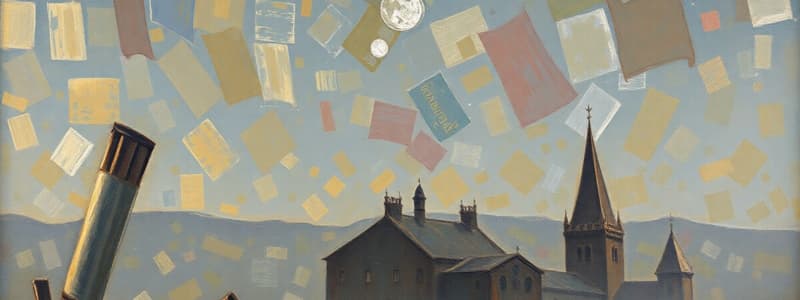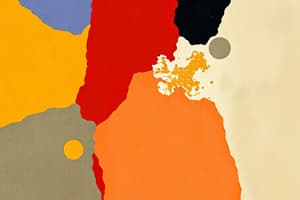Podcast
Questions and Answers
Who is regarded as the 'Father of History'?
Who is regarded as the 'Father of History'?
- Herodotus (correct)
- Socrates
- Plato
- Aristotle
What type of source provides firsthand descriptions of events?
What type of source provides firsthand descriptions of events?
- Interpretative sources
- Secondary sources
- Tertiary sources
- Primary sources (correct)
Which is NOT considered a primary source?
Which is NOT considered a primary source?
- Textbooks (correct)
- Eyewitness accounts
- Autobiography
- Clinical reports
What is the primary focus of historiography?
What is the primary focus of historiography?
What is one of the benefits of studying history?
What is one of the benefits of studying history?
Which of these is an example of a secondary source?
Which of these is an example of a secondary source?
Why do primary sources need interpretation by academics?
Why do primary sources need interpretation by academics?
Which statement accurately describes one of the importance of history?
Which statement accurately describes one of the importance of history?
Who is honored in the naming of the Philippines?
Who is honored in the naming of the Philippines?
What is the purpose of the power used during the celebration mentioned?
What is the purpose of the power used during the celebration mentioned?
What did Ruy Lopez de Villalobos name the islands of Leyte and Samar after?
What did Ruy Lopez de Villalobos name the islands of Leyte and Samar after?
What type of instruments are commonly played during the celebration?
What type of instruments are commonly played during the celebration?
What was the purpose of the law during the Spanish colonization in the Philippines?
What was the purpose of the law during the Spanish colonization in the Philippines?
Which figure is associated with the observations of Tagalog customs and traditions?
Which figure is associated with the observations of Tagalog customs and traditions?
Which celestial bodies are primarily respected in their belief system?
Which celestial bodies are primarily respected in their belief system?
What significant event occurred after Magellan was killed?
What significant event occurred after Magellan was killed?
What is the highest deity among those they worship?
What is the highest deity among those they worship?
Which of the following islands were named by Ruy Lopez de Villalobos?
Which of the following islands were named by Ruy Lopez de Villalobos?
What unique ability do the 'mangagauay' possess?
What unique ability do the 'mangagauay' possess?
Which entity is believed to have the power to kill without any weapon?
Which entity is believed to have the power to kill without any weapon?
What does 'Relacion de las Costumbres de Los Tagalos' refer to?
What does 'Relacion de las Costumbres de Los Tagalos' refer to?
What is one of the manifestations of the 'Magtatangal'?
What is one of the manifestations of the 'Magtatangal'?
Prior to Spanish colonization, were the people in the Philippines already civilized?
Prior to Spanish colonization, were the people in the Philippines already civilized?
What happens to the 'Magtatangal' before sunrise?
What happens to the 'Magtatangal' before sunrise?
What is the role of the Datu in the community?
What is the role of the Datu in the community?
What does the Himaraw refer to in the context of marriage?
What does the Himaraw refer to in the context of marriage?
How were women's social statuses viewed during the pre-colonial period?
How were women's social statuses viewed during the pre-colonial period?
What practice involved compressing babies' skulls?
What practice involved compressing babies' skulls?
What happens to a woman's possessions if she leaves her husband to marry another?
What happens to a woman's possessions if she leaves her husband to marry another?
What was considered a disgrace for women during the pre-colonial period in the Visayas?
What was considered a disgrace for women during the pre-colonial period in the Visayas?
What was a common reaction of Tagalogs toward Buaya?
What was a common reaction of Tagalogs toward Buaya?
Who was the catalonan during the pre-colonial period?
Who was the catalonan during the pre-colonial period?
What does linguistic study help us understand?
What does linguistic study help us understand?
What is the primary focus of ethnography?
What is the primary focus of ethnography?
Which criticism evaluates the physical attributes of evidence?
Which criticism evaluates the physical attributes of evidence?
What does historical criticism examine?
What does historical criticism examine?
What historical figure is associated with the name Ma-i?
What historical figure is associated with the name Ma-i?
How many ships did Magellan start his expedition with?
How many ships did Magellan start his expedition with?
Which entity was King Manuel related to?
Which entity was King Manuel related to?
What did Magellan name the islands during his exploration?
What did Magellan name the islands during his exploration?
Study Notes
History
- The term "historia" originates from Greek, denoting a thorough study
- History is a study of change, and historians study and analyze historical events
- Greek author Herodotus (c. 484 – 425/413 BCE) is known as the "Father of History" for adopting the term "historia" and focusing on local traditions
Importance of History
- History fosters a better understanding of the world and ourselves
- It allows us to learn about other people's perspectives
- It helps us understand change and become better citizens
- History provides tools for better decision-making and cultivates appreciation for various aspects of life
Historiography
- It's the exploration of how historians construct and understand history as a field
- It encompasses the study of different methodologies and approaches within the discipline of history
- Linguistic: studies languages to trace origins and cultural spread of civilizations
- Ethnography: focuses on observing and studying a particular ethnic group and their way of life
Historical Criticism
- Known as the historical-critical technique or higher criticism
- It investigates the origins of ancient texts to understand the historical context surrounding their creation
External Criticism
- Evaluates physical aspects of an item, including its consistency with its period of production
- It assesses the authenticity of the item by studying its materials
Magellan’s Exploration
- Magellan was a Portuguese explorer who sailed to the Philippines
- King Charles V of Spain supported his voyage with five ships
- The crew consisted of approximately 270 individuals
Magellan in the Philippines
- "Ma-Yi" or "Ma-i" (Land of Gold) was the name given by Greek cartographer Claudius Ptolemy, originally referring to the Mindoro island
- Historians argue that "Ma-i," including South Sea islands and Manila, were not islands
- Magellan named the islands "Las Islas de San Lazaro" (Saint Lazarus’ Islands)
- In honor of King Philip II of Spain, the islands of Leyte and Samar were renamed "Las Islas Filipinas"
Pre-colonial Philippines
- The term "Sibilisado," referring to civilization, is questioned in the context of pre-colonial Filipinos
- Filipinos had established intricate societies and customs prior to colonization
Tagalog Customs and Laws
- Juan de Plasencia, a Franciscan priest, documented Tagalog customs in “Relacion de las Costumbres de Los Tagalog”
- Laws established during Spanish colonization aimed to protect indigenous traditions
Barangay System
- Composed of 30 to 100 households
- Barangays interacted and cooperated with each other
- Each barangay was considered equal
Datu
- The leader of the barangay
- Responsible for leadership during wartime and was highly respected
- Individuals committing offenses against the Datu or their family faced punishment
Social Classes
- Maharlika: Freely born individuals often acting as warriors
- Alipin: Individuals who were not born free
Marriage and Family
- Bride price was essential, and the wedding involved a week-long celebration
- The groom's family provided dowry, which could include money, rice, or other valuables
- The dowry amount played a crucial role in the marriage proposal
- "Himaraw" was a compensation paid to the bride's mother for the sleepless nights she spent caring for her daughter
- In cases of divorce, the woman's possessions went to her first husband if she left to marry another.
- If she left without marrying again, she retained dowry.
Pre-colonial Practices and Traditions
- Babies' skulls were compressed for aesthetic reasons using a tool called "tangad"
- Women held equal status with men
- Visayans considered having many children a disgrace
- Celebrated a girls’ first menstruation, which involved drumming and rituals led by "catalonan," a priestess-cum-doctor
Religion and Belief Systems
- The early Filipinos worshipped their ancestors and the forces of nature
- They practiced "Nagaanitos," a form of ancestor worship
- "Bathala" was the highest deity in their pantheon
- They worshipped the sun, moon, and stars
- Deceased individuals with exceptional fighting abilities were often revered
Folk Beliefs
- "Dian masalanta": Patron of lovers and fertility
- "Lacapati and Idianale": Patron of agriculture and livestock
- “Buaya” (Crocodile): Fears of retaliation led to offerings to appease them.
- "Mancocolam": Possessed fire powers and could kill without using any weapon.
Other Supernatural Beings
- "Hocloban": More powerful than sorcerers, capable of healing and killing.
- "Silagan”: Could snatch and eat the liver of people wearing white clothing
- "Magtatangal": Headless beings who wandered at night
Studying That Suits You
Use AI to generate personalized quizzes and flashcards to suit your learning preferences.
Related Documents
Description
This quiz explores the fundamentals of historiography, the significance of history in understanding change, and the diverse methodologies historians employ. Dive deeper into the origins and relevance of historical study through key concepts and figures like Herodotus.




